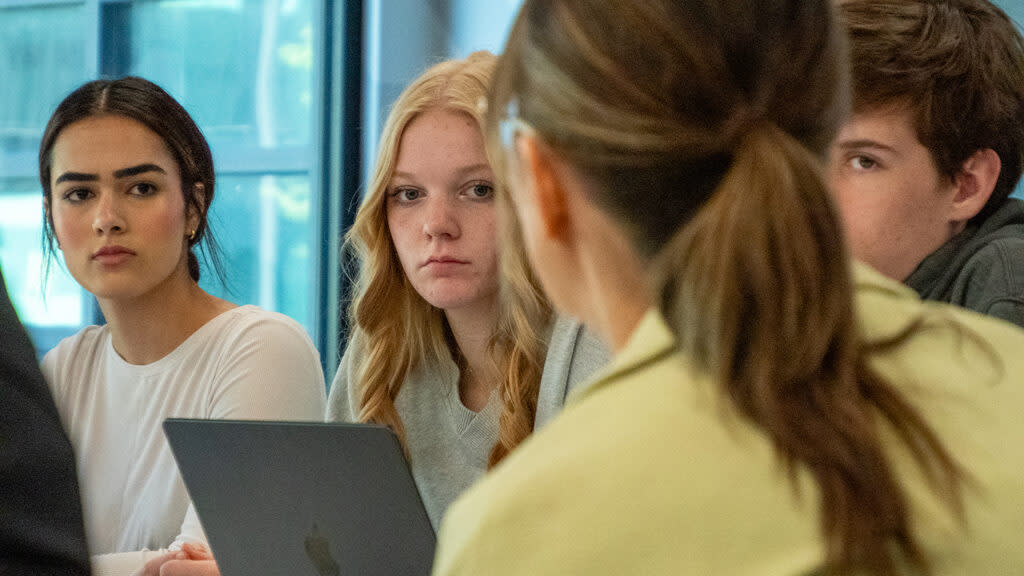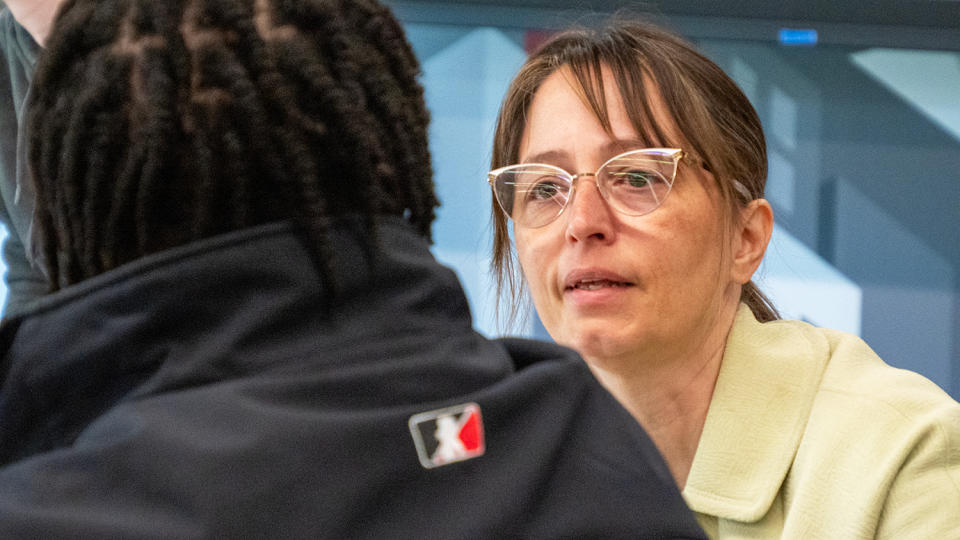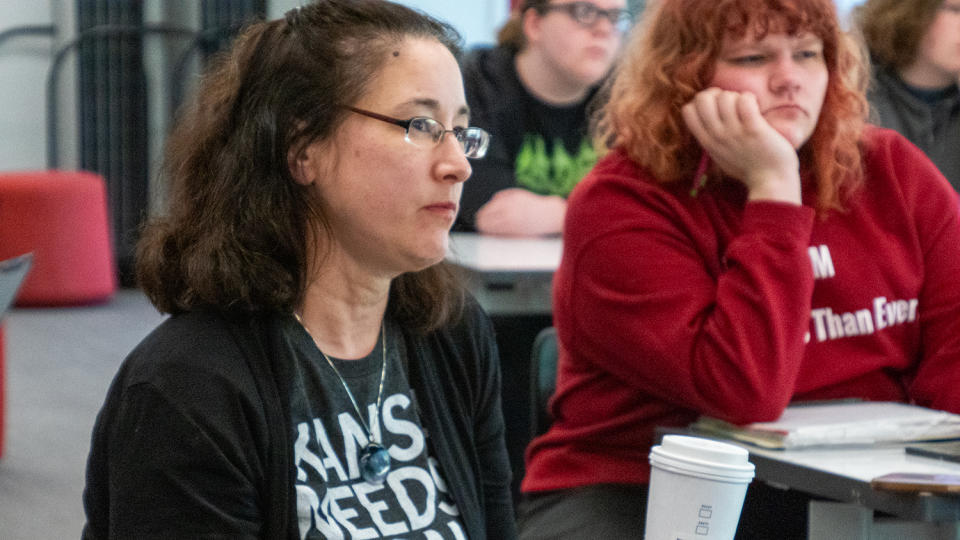Kansas school district deployed spyware. Teen journalists pushed back, but what about the others?

From left, Lawrence High School student journalists Natasha Torkzaban, Maya Smith and Morgan Salisbury meet April 19, 2024, with USD 497 school board president Kelly Jones. (Sherman Smith/Kansas Reflector)
To quote Pink Floyd: Leave them kids alone!
That was my reaction to Kansas Reflector editor in chief Sherman Smith’s story about Lawrence High School students who fought — and won — a battle with the district over spyware installed on their devices. I remember my experiences as a student journalist and would have been similarly outraged by adults sneaking peeks into the reporting process.
I’m not sure I would have been brave enough to speak out in the same way, or with the same mixture of grit, determination and moral purpose as these young people.
Yet a gargantuan question hangs over Lawrence school officials’ decision to tactically retreat in the face of a clear overreach. What about the other kids?
You know, the ones who don’t take journalism classes. What about all the students who still use devices running surveillance software from a company called Gaggle? As Smith reported, the company uses an artificial intelligence program to scan material on students’ school iPads and linked Google accounts. If the AI flags a message or image of concern, the material is then reviewed by a human — Smith found job listings for Gaggle reviewers starting at $10 an hour.
Lawrence, on the other hand, decided to spend $162,285.75 over three years for the monitoring service.
Listen, I understand why district officials and parents want guardrails for students’ online activities while in school. That makes sense. We don’t want them looking up porn or making threats in class.
Kelly Jones, school board president for Lawrence Public Schools, says “school boards are being inundated with products that are meant and designed and marketed to protect students.” (Sherman Smith/Kansas Reflector)
But that’s not what Gaggle promised, or what Unified School District 497 spokeswoman Julie Boyle told Smith. Both justified privacy violations with high-minded rhetoric about protecting students’ mental health. I’m sorry, but count me skeptical that clunky AI and adults making less than three dollars above the federal minimum wage have made a serious difference in the well-being of Lawrence children.
Instead, what you might expect to happen indeed happened: False red flags, uncomfortable meetings with administrators and clear-cut violations of student rights.
Lawrence school board president Kelly Jones put the situation in a broader context, one in which gun violence has become a daily threat.
“School boards are being inundated with products that are meant and designed and marketed to protect students — in terms of billions of dollars worth of sales that come from public education to protect our students,” she said.
Jones added that “there’s a balance between which of those products are doing what we hope they do, which is make our buildings and our students and our staff as safe as possible, while also protecting their rights as individuals to have autonomy and choice in what they communicate.”
As a parent of a child in the Lawrence school district, I recognize these challenges all too well. After the multiyear shock of the COVID-19 pandemic and resultant societal disruption, teens and adults alike have struggled. Yet the idea that we can ameliorate the challenges with emerging technology strikes me as naive.
Barbara Tholen, journalism teacher at Lawrence High School, shared her thoughtful take: “We all know that this mental health crisis is very real, and the challenges of them figuring out how to address it I certainly understand. I think it’s valuable to have some real deep reflective questions about how we’re addressing it, though.”
Lawrence High School journalism teacher Barbara Tholen, left, says “we should be wary of people who are offering quick solutions to deeply challenging problems.” (Sherman Smith/Kansas Reflector)
We all want the best for our kids, sure. But how do we get it?
I would suggest that surveilling young people electronically, intercepting their communications and leaving hard calls to computers does more harm than good. Teens will learn they can’t trust the people around them. Building relationships and listening to those same young people might take time, but at least it can be done honestly. Rather than seizing on spyware, adults should consider addressing climate change, the cost of living, affordable college and other measures. That might give young people something to look forward to, rather than anticipate with mounting dread.
Students deserve free expression. They also deserve the freedom to chart their own course and figure out their own beliefs and course in the world. Adults can find that threatening — be they social conservatives limiting access to certain books or bewildered progressives trusting balky software.
More broadly, those in power don’t like being challenged. Take the confusing contretemps at Columbia University, where officials have cracked down on sprawling student protests over the Israel-Palestine war. Because authorities cracking down on protests always goes so well. Or take the abuses of government power in Marion and Alabama, where journalists were targeted for simply doing their jobs. (The charges against journalists in the Alabama were dropped Friday, by the way.)
The heavy hand of government should be applied sparingly when it comes to the personal expression of teenagers or grownups. Surely liberals and conservatives and libertarians can agree on that. Especially the libertarians.
Give the kids space. Take care of them, yes, but let them learn and grow without the constant threat of ominous oversight.
They will be running this all soon enough. Let’s raise them right.
Clay Wirestone is Kansas Reflector opinion editor. Through its opinion section, Kansas Reflector works to amplify the voices of people who are affected by public policies or excluded from public debate. Find information, including how to submit your own commentary, here.
The post Kansas school district deployed spyware. Teen journalists pushed back, but what about the others? appeared first on Kansas Reflector.



